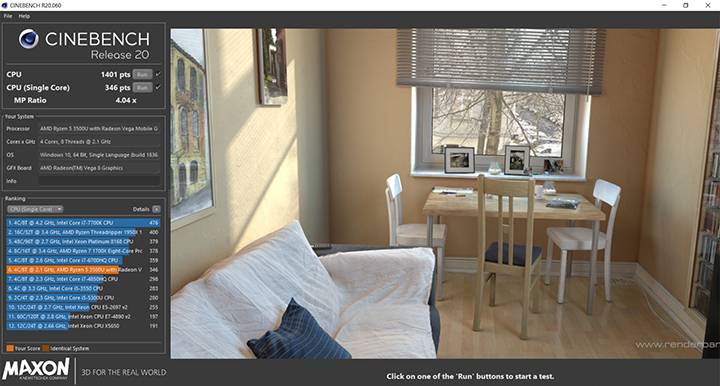If you’ve seen our laptop reviews, then you’ve seen Cinebench in our benchmarking and performance section. But what exactly is Cinebench, and what does it test? Today, we’ll be discussing the synthetic benchmark Cinebench, how to run it on your system, and the difference between the two versions.

Table of Contents

Cinebench is a synthetic benchmark used to test a computer’s raw CPU horsepower. An image is rendered using Cinema 4D’s 3D engine, and then an arbitrary score is shown to show how well the CPU handled the task. It’s also a great tool to test whether or not the CPU can sustain its clock speeds, temperature, and real-life 3D tasks.
Cinebench is popular among tech reviewers and enthusiasts alike because first, it works well with both Intel and AMD based systems. Second, it uses all available CPU cores, and lastly, the scores are absolute, hence comparing two processors are straightforward. Overclockers also use this test to check the performance gain of their CPU relative to its stock settings.

Cinebench R20 is a free tool that is downloadable through the Microsoft Store. To test the full extent of your CPU, click Run on the upper left hand of the screen. If you’re looking to test for single-core performance, click on file -> Advanced Benchmark, then a CPU (Single Core) option should pop out below the CPU option. After running both tests, Cinebench will display an MP Ratio or the ratio between single and multi-core results.
Cinebench R20 is the latest version of Cinebench. It requires eight times the computational power and four times the memory to render the image compared to R15. Due to the difference in testing methodology, Cinebench R20 and R15 scores are not comparable to one another. If you’re wondering why we’re still using Cinebench R15 over the more superior R20, it’s so people can compare older machines with new releases.
And there you have it! We hope this article has helped you understand what Cinebench is and what it tests. If there are other benchmarking tools you want help explaining, let us know in the comments below.

YugaTech.com is the largest and longest-running technology site in the Philippines. Originally established in October 2002, the site was transformed into a full-fledged technology platform in 2005.
How to transfer, withdraw money from PayPal to GCash
Prices of Starlink satellite in the Philippines
Install Google GBox to Huawei smartphones
Pag-IBIG MP2 online application
How to check PhilHealth contributions online
How to find your SIM card serial number
Globe, PLDT, Converge, Sky: Unli fiber internet plans compared
10 biggest games in the Google Play Store
LTO periodic medical exam for 10-year licenses
Netflix codes to unlock hidden TV shows, movies
Apple, Asus, Cherry Mobile, Huawei, LG, Nokia, Oppo, Samsung, Sony, Vivo, Xiaomi, Lenovo, Infinix Mobile, Pocophone, Honor, iPhone, OnePlus, Tecno, Realme, HTC, Gionee, Kata, IQ00, Redmi, Razer, CloudFone, Motorola, Panasonic, TCL, Wiko
Best Android smartphones between PHP 20,000 - 25,000
Smartphones under PHP 10,000 in the Philippines
Smartphones under PHP 12K Philippines
Best smartphones for kids under PHP 7,000
Smartphones under PHP 15,000 in the Philippines
Best Android smartphones between PHP 15,000 - 20,000
Smartphones under PHP 20,000 in the Philippines
Most affordable 5G phones in the Philippines under PHP 20K
5G smartphones in the Philippines under PHP 16K
Smartphone pricelist Philippines 2024
Smartphone pricelist Philippines 2023
Smartphone pricelist Philippines 2022
Smartphone pricelist Philippines 2021
Smartphone pricelist Philippines 2020